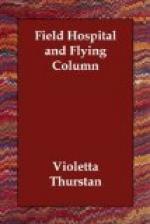All the next morning we went through the same kind of country, past innumerable frozen lakelets, and copses of stubby pines and silver birches, till we arrived at Karungi where the railway ends. We made friends with a most delightful man, who was so good in helping us all the way through that we christened him St. Raphael, the patron saint of travellers. He was a fur trader from Finland, and had immense stores of information about the land and the queer beasts that live in it. He was a sociable soul, but lived in such out-of-the-way places that he seldom saw anyone to talk to except the peasants, and it was a great treat, he said, to meet some of his fellow-countrymen, and his satisfaction knew no bounds when he heard that one of us hailed from Lancashire, near his old home.
From Karungi we had to drive to Haparanda. Our carriage was already booked by telegram, but a very irate gentleman from Port Said got into it with his family and declined to get out, using such dreadful language that I wondered the snow did not begin to sizzle. We did not want to have a scene there, so when “St. Raphael” said if we would wait till the evening he would take us over by starlight, we graciously let the dusky gentleman with the bad temper keep our carriage.
We went in the meantime to the little wooden inn and ate largely of strange dishes, dried reindeer flesh, smoked strips of salmon, lax, I think it is called, served with a curious sweet sauce, and drank many glasses of tea. At 9 P. M. behold an open motor-car arrived to take us the thirty miles’ drive to Haparanda. It seemed absolutely absurd to see a motor-car up there on the edge of the Arctic Circle, where there was not even a proper road. There were several reindeer sleighs about, and I felt that one of those would have been much more in keeping. The drivers look most attractive, they wear very gay reindeer leggings, big sheep-skin coats and wild-looking wolf-skin caps.
The frozen track was so uneven that we rocked from side to side, and were thrown violently about in the car, like little kernels in a very large nut. But it was a wonderful night all the same, the air was thin and intoxicating like champagne, and the stars up in these northern latitudes more dazzlingly brilliant than anything I have seen before. We had to get out at Haparanda and walk over the long bridge which led to Torneo, where the Finnish Custom House was, and where our luggage and passports had to be examined.
We arrived there very cheerful and well pleased with ourselves, to find all our old travelling companions waiting till the Custom House was open; the bishop and his party; the bad-tempered man and his family; a Russian and a Chinese student who were travelling together, and some others. They had been waiting in the cold for hours, and had not had their papers or luggage examined yet, so we had had the best of it after all.
And we scored yet once more, for “St. Raphael,” who spoke fluent Finnish, at once secured the only cart to take our things over the ferry to the railway station about half a mile away.




